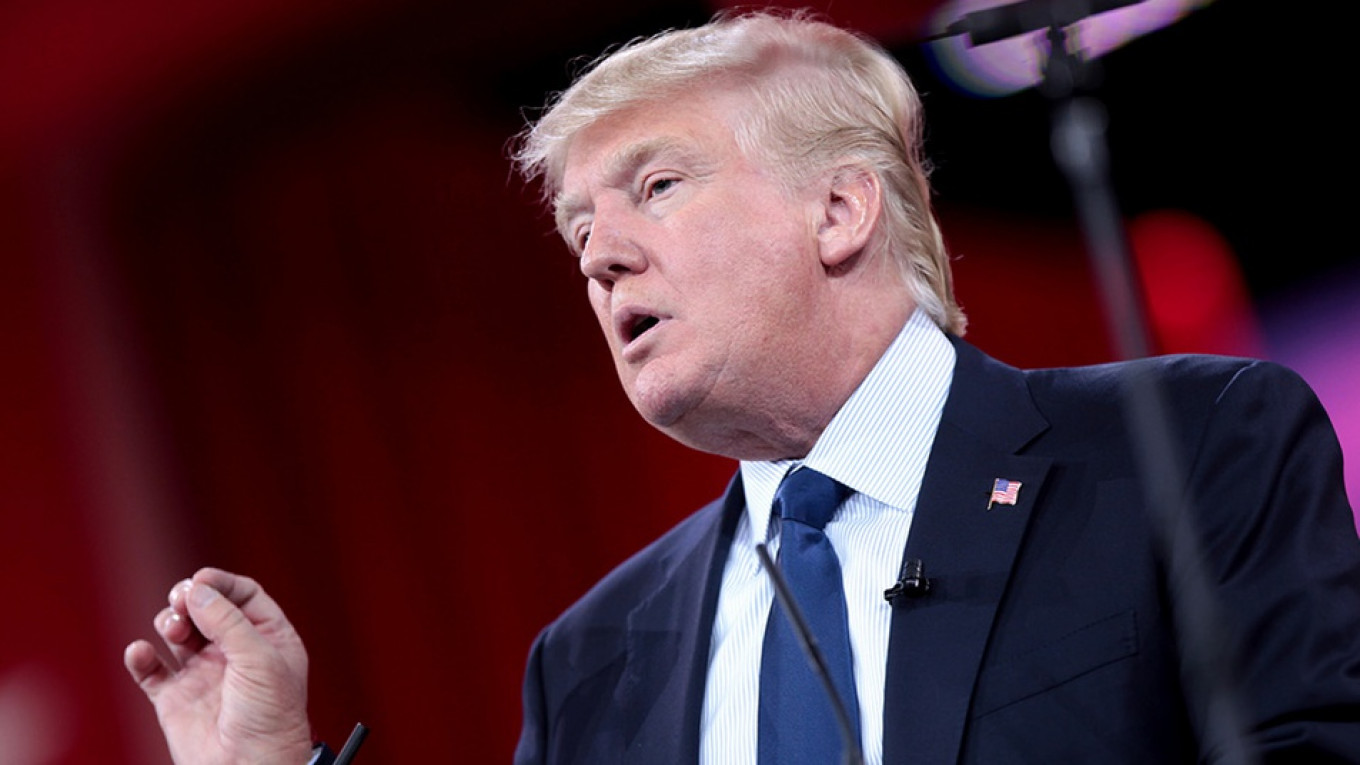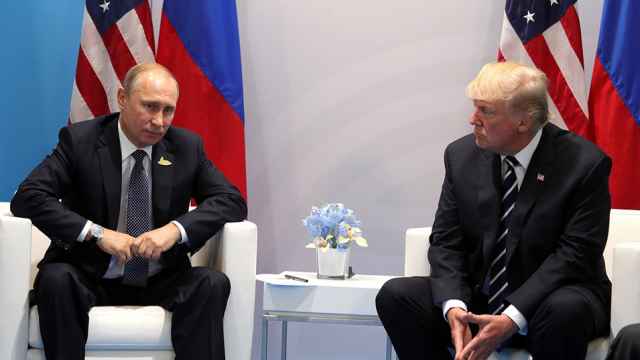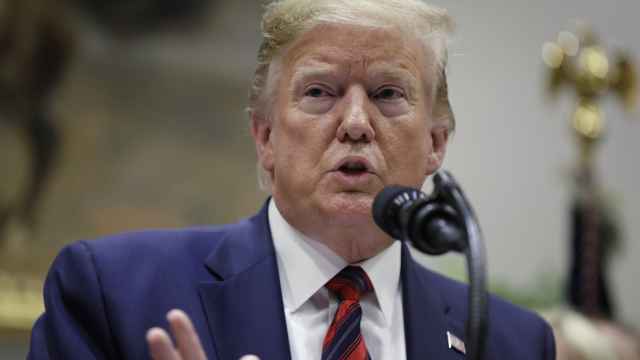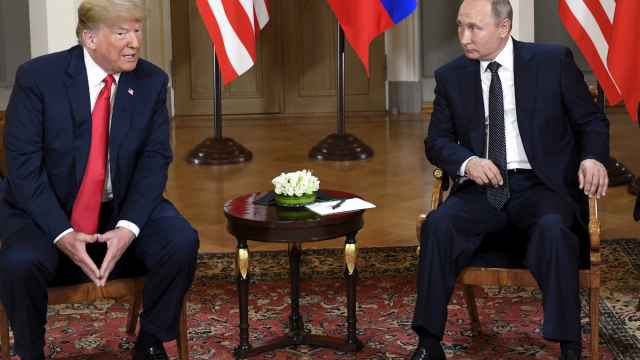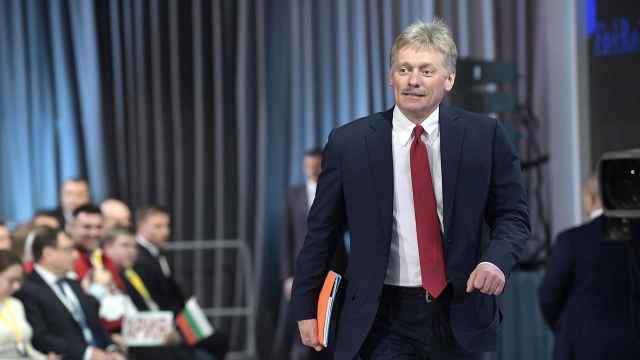President Donald Trump’s decision to ditch the Intermediate-Range Nuclear Forces (INF) treaty with Russia has clear advantages for both Trump and his Russian counterpart Vladimir Putin. It is, however, a problem for countries in the middle – and for what remains of a treaty-based global order.
Columbia University professor Stephen Sestanovich, who served as senior director for policy development at the U.S. National Security Council from 1984 to 1987, the year the INF treaty was signed, describes the deal as “the most one-sidedly good arms-control agreement any U.S. President has ever signed.” It eliminated 1,752 Soviet missiles, including all the feared SS-20s aimed at the European allies of the U.S., along with 859 less powerful U.S. missiles deployed in Europe to counter the threat.
By the time Soviet President Mikhail Gorbachev unexpectedly agreed to the trade-off, which his predecessors had firmly rejected, the Soviet economy was faltering and Gorbachev was intent on ending the arms race with the U.S. But the deal wasn’t really so one-sided: The Soviet leadership was spooked by the Pershing II missiles the U.S. had deployed in Germany, which were far more precise than the SS-20s. Anyone interested in recalling the panicky atmosphere created in the Soviet bloc by the deployments should watch the excellent TV series, Deutschland 83.
At the same time, anti-American sentiment rose in Europe, and particularly in Germany, where hundreds of thousands of people, led by the widely respected former Chancellor Willy Brandt, demonstrated against the Pershings. Protest movements also arose elsewhere in Europe, where the U.S. was deploying cruise missiles, also in response to the SS-20s.
“It was a debate about nuclear weapons and not just about how many cruise and Pershing to deploy. Governments started to wobble,” senior North Atlantic Treaty Organization official Jamie Shea recalled in a 2016 lecture. In 1983, German Chancellor Helmut Schmidt, a Social Democrat, lost power after his party’s uneasy coalition with the pro-business Free Democrats broke down: The Free Democrats didn’t want to stay in an alliance with a party whose left-wing was strongly anti-U.S. and anti-Pershing.
When he signed the treaty, Gorbachev was taking care of Soviet fears of a Western strike on Moscow, which the Pershing IIs could reach in about 10 minutes; Reagan was both getting rid of the SS-20 threat and trying to assuage the European allies’ uneasiness at being targets.
Time didn’t stop in the mid-1980s, however. After the destruction of the missiles covered by the treaty, Russia began chafing about new U.S. capabilities, including drones, which weren’t an issue in 1987, and worrying that anti-missile installations in eastern Europe could be used for offensive purposes. The U.S., for its part, accused Russia of testing, and lately deploying, missiles that violate the INF treaty. At the same time, China, not bound the Reagan-Gorbachev deal, was free to deploy short- and medium-range missiles, creating a potential threat to U.S. allies in Asia that the U.S. wasn’t free to counter. Russia, too, has complained about China’s freedom from the treaty’s constraints.
Under these circumstances, Trump’s pullout from the treaty allows him to say he’s doing what’s best for the U.S. and its allies and forcefully countering the Russian cheating. It’s politically useful for Trump to be tough on Russia, and if tearing up the INF treaty leads to a new arms race, Russia is the clear underdog. In the context of worsening relations with China, it’s natural for Trump to seek more leverage.
On the other hand, Putin also benefits. As Sestanovich pointed out, the U.S. was “free under the treaty to move forward with a robust program of new deployments, all the while generating a steady stream of public accusations about Russian duplicity.” Now Trump has given up this convenient position, lending credence to the Russian view that in today’s world, all rules are out the window and everyone must fend for themselves. Russia no longer needs to hide its work on shorter-range missiles or their deployment, and it can describe it as a response to U.S. disrespect for fundamental international frameworks.
In terms of domestic politics, Trump probably stands to benefit more than Putin. His decision to throw off the arguably obsolete constraints of the INF treaty is easier to explain to voters than arms control experts’ arguments that he should have applied more diplomacy and used the moral high ground the treaty gave him. Putin, for his part, appears to face diminishing returns from confronting the West, as Russians want better economic prospects rather than more “greatness” on the global stage.
The real losers here are the countries that will be caught in the middle. The U.K. government announced, perhaps not surprisingly given the recent poisonings in Salisbury, it stood with Trump; but the German government doesn’t relish the thought of a repeat of the mass demonstrations that rocked the country when the Pershing IIs were deployed. Its statement expresses regret about the U.S. decision to abandon “an important element of arms control that especially serves European interests.”
If European members of the North Atlantic Treaty Organization are asked to deploy U.S. weapons aimed at Russia, this may cause new ruptures within the alliance, pushing Europeans to work toward a security system that’s less dependent on the U.S. In Asia, too, U.S. allies may wonder about the advisability of challenging China, which, like Russia, has condemned Trump's decision to exit the INF treaty.
Judging by Trump’s remarks on Saturday as he announced his intention to withdraw from the treaty, he wants to induce Russia and China to agree “let’s none of us develop those weapons.” But if that’s the ultimate goal, the U.S. could have pushed more actively for making the treaty multilateral and negotiate additional provisions covering specific Chinese, Russian and, inevitably, also U.S. weapons programs.
As things stand, countries caught in the middle see yet another reason to consider Trump as much of a loose cannon as Putin. They probably would have appreciated some calmer thinking and diplomatic skill from Washington, just for a change.
Leonid Bershidsky is a Bloomberg View columnist, the founding editor of the Russian business daily Vedomosti and the founder of the opinion website Slon.ru. The views expressed in opinion pieces do not necessarily reflect the editorial position of The Moscow Times.
A Message from The Moscow Times:
Dear readers,
We are facing unprecedented challenges. Russia's Prosecutor General's Office has designated The Moscow Times as an "undesirable" organization, criminalizing our work and putting our staff at risk of prosecution. This follows our earlier unjust labeling as a "foreign agent."
These actions are direct attempts to silence independent journalism in Russia. The authorities claim our work "discredits the decisions of the Russian leadership." We see things differently: we strive to provide accurate, unbiased reporting on Russia.
We, the journalists of The Moscow Times, refuse to be silenced. But to continue our work, we need your help.
Your support, no matter how small, makes a world of difference. If you can, please support us monthly starting from just $2. It's quick to set up, and every contribution makes a significant impact.
By supporting The Moscow Times, you're defending open, independent journalism in the face of repression. Thank you for standing with us.
Remind me later.



